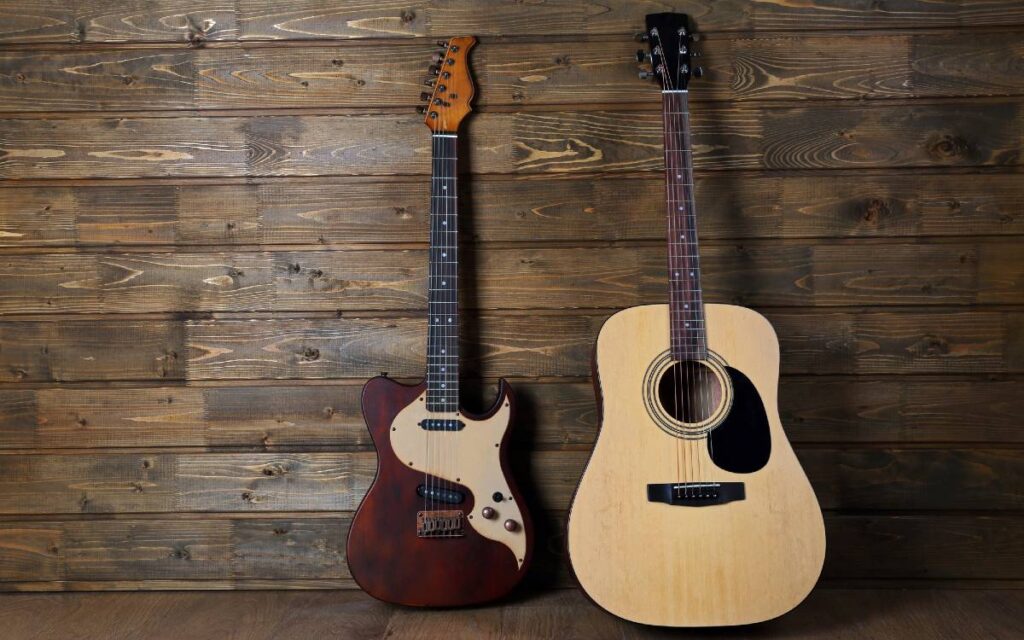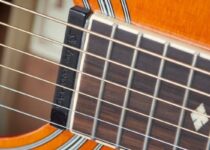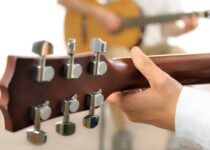One of the most common questions new guitarists ask is: “How long does it take to learn guitar?” or “How long does it take to get good at guitar?”
The truth is that it varies from person to person. It often becomes less about knowing how long it takes and more about wanting some validation, and people want to know it will be worth the effort.
It’s not an exact science, but there are some general markers for the time you could spend to improve your guitar skills.
| Level | Hours Needed | Months (1 Hour Daily Practice) |
|---|
Knowing that, let’s discuss your journey to becoming a great guitarist.
Post Contents
The Problem with the 10,000 Hour Rule
Most of us are familiar with this rule. It implies that it takes 10,000 hours to achieve master-level competency in a complex skill.
In answer to the question, “how long does it take to learn guitar”, the actual number of hours varies from case to case. But, you could safely accept the notion that someone who invests 10,000 hours in practicing can achieve a high level of proficiency.
Yet, most people won’t need anywhere near that long to be gig-ready, so don’t be intimidated by the notion of spending 10,000 hours.
Keep up a steady practice regime, and you’ll get there eventually – or don’t. Learning an instrument doesn’t need to be about being the best in the world, and you’ll only need to decide what level you want to be at.
How Long Does it Take to Learn Guitar? (Guitar Learning Timeline)
Keep in mind that everyone is different. We all learn things at our own pace, and some skills will come easier than others.
Jimi Hendrix, Jimmy Page, Eddie Van Halen, and all other real life examples of guitar legends started as absolute beginners. They practiced their butts off to become excellent guitar players, and so should you if you want to be a rock star.
You may not be able to play a song yet, but you will go from playing a couple of chords to playing a few songs to writing your on songs on guitar and beyond simply by investing time to consistent practice.
Newbies (Basic Chords and Strumming): 0 – 150 Hours
For anyone who wants to start learning guitar, they will find themselves at zero. It’s the start of the journey.
As an absolute beginner, you won’t even know how to hold a guitar. But with a little bit of guidance, you’ll pick up a few chords used in most pop and rock songs and start to get a feel for strumming.
Your fingers will probably hurt from pressing down on the strings while learning chords, and your guitar playing will sound and feel awkward. The initial progress is slow, and it might demotivate you.
All guitarists go through that.
Stick to your guns (or guitar in this case), and you’ll start to feel more and more comfortable with each practice session. And you’ll gain some basic knowledge of music as you learn guitar.
The back end of this initial period is when you will start to see explosive gains in your ability. Your basic skills should begin to click, such as using a couple of different strumming patterns to play simple chords. You should even have the ability to play a whole song or two at this point. Practice daily to get through this period as quickly as possible.
Beginner: 250 – 750 Hours

At this point, you will be able to play a couple of simple songs and feel comfortable with them. You’ll be holding the guitar correctly and nailing most of the basic open chords, perhaps power chords too.
This level is where you start diving into some more complex guitar techniques. You’ll begin to learn more advanced strumming techniques, and perhaps some licks or fingerpicking.
You’re now building your calluses, developing two-hand coordination, and the ability to pick single strings. You have a grasp of the fundamentals, your rhythm is getting better, and you can continue to learn guitar independently.
It should come naturally to read tabs on sites such as ultimate guitar now.
Many students lose interest at his point—those who don’t, however, carry over to the next phase. To stay motivated, think about where you were just a couple of months ago, and look at where you are now. The awkward songs you used to play now actually sound like they should – there’s plenty more to come.
Intermediate: 750 – 1750 Hours
At the intermediate level, you’re still learning, but your standards are a lot higher, and the techniques you know are getting more complex. You’re likely dabbling in basic music theory and some simple improvisation.
By now, you’re strumming chords without any issues, and you can start learning more complicated chords during your practice time, which seemed impossible a few months ago.
That initial excitement about learning guitar might start wearing off at this point. You’re still learning, but the increments are just smaller than they were before.
Many players plateau at this level, and that’s fine for many guitarists. Being able to bang out the chords for most songs on an acoustic guitar means you could start gigging as a soloist. After this many hours on the guitar, you can probably play some satisfying lead lines and solos too.
Advanced: 1750 – 2750 Hours
If you’ve reached this stage, pat yourself on the back. Most never even hit this point. It’s not so much the hours now, but the consistency in which you practice. You’ll never learn guitar to an advanced level if you don’t practice regularly.
By this point, you should be deep-diving into music theory, playing basic songs by ear, and smashing out some impressive lead guitar skills.
With all the regular practice time, you’re shaping up to be the guitarist that you always dreamt of being. The songs you play sound great, you have the muscle memory needed as a guitarist, and you don’t even have to think about where your fingers should go now.
Advanced players know most of the complex open chords, have no issues with barre chords (sometimes called bar chords), and can usually play comfortably in a band setting.
It may feel like you’ve done it all. But, there’s still a lot to learn, and someone who is on the ball with their guitar playing knows the areas that need improvement.
To improve your skill level from here, you have to accept that practicing guitar is a lifelong journey. To break through the barriers now, you’ll have to practice daily on complex skills, and pick songs to learn that challenge your already impressive skill set.
Expert: 2750 – 5000 Hours
This stage is what most people consider “guitar goals.” Here, with each practice session you’re exploring techniques you never even thought of when you first started playing guitar.
Sweep picking, crazy time signatures, complex fingerpicking, and percussive acoustic performances are all musical concepts you could explore as an expert guitarist.
You may make it look easy to implement these concepts, but the people watching won’t be aware of the few weeks’ worth of practice hours you’ve put into just one small section of music.
Becoming an expert guitarist requires an obsession with the craft. Most of those sharp increases in skill are behind you, and you’ll need a great deal of time spent playing repetitive drills to improve.
People now take you more seriously as a guitarist, and as your skills are acknowledged, you’re likely playing solo gigs or in a band.
Performing in a band teaches you valuable lessons of communication and teamwork, which is impossible if you learn to perform by yourself.
Even if you’ve always practiced with a metronome, the rest of the band may not have. Being able to play with a band is a skill in itself.
Professional: 5000 – 10000 Hours
The need for regular practice has become less relevant because, as a professional, you’ve put the hours in the be one of those guitar players that other musicians can rely on.
Playing songs (even difficult ones) by ear seems easy for you as you understand all the theory and language behind music. You also find it easy to write songs and jam with other professional musos.
You’re now better than most guitarists, and making your guitar sing seems as easy as breathing.
As a professional, you’re likely making money from your guitar skills, whether that’s through cover gigs, working as a guitar teacher, releasing your own music, or as a session musician.
Master: 10000 – 20000 Hours
You have mastered 99% of the knowledge. You have crossed the 10,000-hour threshold proposed by Malcolm Gladwell. At this point, you’re probably a world-class musician.
You have names for all 15 of your guitars, but you prefer to play with just one of them. You’re likely playing and entertaining others as your full-time job.
You’ve made it, but you’ll never stop learning. To get this far in the first place, you’ve proven that you love guitar and will be continuing your guitar journey until the day you die.
A Note About These Estimates for How Long it Takes to Learn Guitar
Hours can help you estimate your potential skill level as you progress, but they aren’t enough to gauge how long it could take to learn guitar.
Your practice schedule can significantly skew the learning curve.
As an example, if you practice for one hour each day as a newbie, it could roughly take you around eight months to get to the beginner level. If you decide to put in two hours in a day, then you can get there within four months, and so on.
You could say the same thing about whether or not you practice consistently. You could easily have put in 1000 hours over 15 years but not be anywhere near as accomplished as if you put in those same hours over a year.
For most people trying to learn guitar, it’s always a better idea to split your practice sessions into smaller chunks. As an example, instead of having a tedious 2-hour session, you can split them into four short 30-minute sessions. Doing this allows you to have regular breaks, and having these breaks will allow your brain to process the information effectively.
Sometimes you will be blown away at how much easier things seem after a break or a good night’s sleep. If you’re having trouble with a technique or song, a hot tip is to practice right before bed and then again first thing in the morning.
To repeat – It’s not the total time you spend; it’s the consistency and quality of your practice time.
Where Do I Start?
All the Gear and No Idea

Some new guitarists get confused by the options available when they try to find a guitar that suits them.
It’s a good idea to think of your favorite songs and artists when choosing. Do they use an electric or acoustic guitar? Do they use a particular brand? You’ll get closer to their tone with a similar guitar.
Acoustic guitars are generally a good place to start as they’re a little bit more forgiving for misplays. But there’s no rule saying you can’t start with an electric guitar.
There’s no point spending thousands on your first guitar just in case you don’t stick it out. Something in the mid-range would be much better to play than the cheapest options, and they also hold most of their value in the second-hand market when you upgrade.
Kicking Goals and Managing Expectations
Walking somewhere without a destination in mind is kind of pointless. Having goals will keep you motivated and help you keep track of your progress while learning to play guitar.
If you’re a beginner, you could start with learning a few chords, then transitioning between them with basic strumming patterns, all the way up to playing a whole song.
Remember to never put pressure on yourself. In the end, it’s only going to make you feel worse. Don’t aim for something super difficult straight off the bat. Give yourself time to learn.
Some online guitar lessons may help you figure out some appropriate guitar goals. Some initial lessons with a guitar teacher could also be a good idea.
Learning guitar is a slow and often frustrating experience. You shouldn’t expect to be able to smash out solos and play songs smoothly in your first few months.
Breaking Through the Plateau
Plateaus happen whenever you fall into the same routine. It’s a period of stagnation that follows a period of improvement. You feel like you’re not getting better, but not getting worse either. This monotony can be a cause for incredible frustration.
Plateaus can cause skilled guitarists to give up temporarily, or worse, permanently.
To counter this, try learning something new. Maybe even try switching genres. Varying techniques can help your brain to start making progress again. Try finding inspiration; watch some live music or read some guides on new approaches to the instrument.
It’s the definition of madness to repeat something over and over again and expect a different result. However, drilling difficult skills over and over can help to break through plateaus.
You will get angry. But, remember that this happens to every guitarist, and take some solace in that thought.
Your Strategy for Playing Guitar
Determining your strategy depends on a ton of variables. Maybe you have a family to take care of, commitment to a job, or other activities that can influence how much time you can practice guitar. You can mitigate these problems by setting a consistent time for your practice sessions.
Even if you can just spend 30 minutes every other day practicing, make sure to stay consistent with it.
It may feel like you’re not getting any better at first, but suddenly your calluses develop, your muscle memory kicks in, and voila – you start to feel competent!
Frequently Asked Questions
How Many Hours a Day Should I Spend Practicing?

Half an hour a day can be a good start for beginners. Yet, your fingers may be in pain from the previous day. You don’t want to hurt yourself, so listen to your body and don’t pick at your callouses when they start to develop.
If you can’t do 30 minutes a day, 3 minutes is still better than 0. Just do what you can when you can if you have trouble finding the time. Work your way up from there.
Is It Possible to Learn to Play Guitar More Quickly?
Yes, it’s possible. If you practice with focus, then you’re going to be able to learn quicker. A consistent routine will speed up the learning process compared to a single practice session that goes for hours.
Is Electric Guitar or Acoustic Guitar Better for Beginners?
Nylon string acoustic guitars have the most forgiving strings for soft fingers, and electric guitars are the next best, followed by steel-string acoustics. In any case, if you’re practicing often enough, you’ll develop callouses in a week or two, and it won’t matter anymore.
Pick a guitar that suits the style of music you wish to play and go from there.
Am I Too Old To Learn Guitar?
Robert Floyd said, “It’s never too late to start something new.” The only thing stopping you from achieving greatness is you!
Progress in music is all about how determined you are. Don’t let any ideas like this hold you back.
While it’s true that young people learn instruments easier, older people can still learn. It’s also great for your memory to learn new skills such as how to play guitar. Make each practice session count by staying focused. You’ll be able to play a few songs in no time.
Do I Need Expensive Gear?
The most expensive guitar will still sound terrible if played by a lousy guitar player. Yet, a “nice guitar” is generally called that because of its playability.
You don’t need to learn to play on a $1000+ guitar, but you should spend as much as you can afford without experiencing buyer’s remorse. Read up online or visit your local music store before you make your decision.
On the low end of the scale, even spending an extra $100 can get you a guitar that’s leaps and bounds ahead of a cheap one. However, it’s more about your effort than the instrument as a beginner.
How Can I Be the Best Guitarist I Can Be?
It’s all about practice. The beginning is always a bit hard, persevere and we assure you, you will be getting on track to be excellent in no time. Having a great teacher can be a tremendous help, but they aren’t a substitute for hard work it takes to learn guitar.







